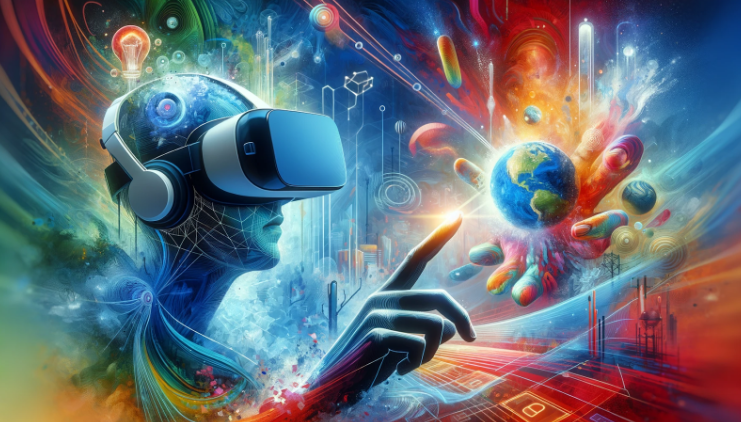Virtual reality (VR) technology is no longer a distant future concept; it has become an integral part of our digital and physical lives. This transformative technology is redefining the boundaries between the two realms, offering immersive experiences that were once the stuff of science fiction. VR’s capability to simulate real-world environments in a digital space has found applications far beyond gaming, extending into education, healthcare, and even online gambling platforms like lucky-star.games/online-casino. This integration highlights VR’s potential to revolutionise traditional online experiences, providing a glimpse into the future of digital engagement.
Tracing the Arc of Virtual Reality’s Development
The journey of VR from its nascent stages to the sophisticated technology we see today is a testament to human ingenuity and technological progress. Initially conceptualised as a tool for enhancing video game experiences, VR has burgeoned into a versatile platform impacting various sectors. Its growth signifies a paradigm shift towards immersive digital environments that replicate the physical world with astounding accuracy. Today, VR is not just about entertainment; it’s a pivotal tool in education, offering immersive experiences that make learning more interactive and impactful.
Merging Digital Presence with Physical Interaction
Virtual reality is revolutionising the way we perceive and engage in social interactions. By creating virtual spaces that mimic physical settings, VR allows for a new form of presence and connectivity. This innovation is particularly poignant in times when physical distancing is necessary, offering a semblance of normalcy and human connection through digital means. VR’s ability to transport users to virtual meeting spaces or social gatherings is redefining the concept of presence, making distance a negligible factor in human interaction.
Transforming Professional and Educational Training
The application of VR in professional training and education underscores its potential to enhance learning and operational efficiency. By simulating real-world scenarios, VR provides a risk-free platform for learners and professionals to hone their skills. This capability is invaluable in fields where practical experience is paramount, offering a blend of safety, scalability, and immersion that traditional training methods cannot match.
Innovating Customer Engagement in Retail and Real Estate
In the realms of retail and real estate, VR is pioneering new ways for consumers to explore and interact with products and properties. Virtual tours and product demonstrations offer a level of interactivity and immersion that traditional online browsing cannot provide. This shift not only enriches the consumer experience but also introduces efficiencies in how products and properties are marketed and sold, marking a significant advancement in customer engagement strategies.
VR’s Integration into Everyday Life: A Closer Look
- Educational Advancements: VR’s role in education is transforming traditional learning paradigms, making education more engaging and accessible.
- Healthcare Innovations: In healthcare, VR is opening new frontiers in treatment and rehabilitation, offering innovative solutions that enhance patient care.
Navigating the Challenges and Seizing Opportunities with VR
The integration of VR technology brings a set of challenges and opportunities that need to be navigated carefully. Accessibility issues, such as the cost and need for specialised equipment, are gradually being addressed through more affordable solutions and the development of mobile VR. The evolution of VR content creation, marked by a growing community of developers and advancements in user-generated content, is expanding the possibilities for VR applications across various fields.
The Challenges and Opportunities of VR Integration
| Aspect | Challenge | Opportunity |
| Technology Access | High cost and need for specialised equipment | Increasing affordability and mobile VR solutions |
| User Experience | Motion sickness and user interface limitations | Ongoing improvements in hardware and software |
| Content Creation | High production costs and technical expertise | Growing developer community and user-generated content |
Personal Insights: The Transformative Impact of VR
Reflecting on my journey with VR, from initial encounters in gaming to professional applications, it’s clear that VR’s potential goes beyond mere entertainment. It has become a vital tool in my professional toolkit, enabling more effective collaboration and problem-solving. These experiences highlight VR’s capacity to enhance not only individual experiences but also collective endeavours, underscoring its transformative impact on how we work, learn, and connect.
Embracing the Future: VR’s Role in Shaping Our World
As we stand on the cusp of a new era where virtual and physical realities are increasingly intertwined, VR presents both exciting possibilities and ethical considerations. The future of VR is not just about technological advancements but also how we choose to integrate these experiences into our lives. It challenges us to reconsider our perceptions of reality, urging us to embrace the vast potential of VR while being mindful of its implications.
In conclusion, virtual reality is transforming our interaction with the digital world, blurring the lines between the virtual and the physical. From enhancing user experiences on platforms like lucky-star.games/online-casino to revolutionising professional training, VR is redefining what’s possible. As we navigate this new landscape, the onus is on us to leverage VR’s potential responsibly, ensuring that as we venture further into the realm of virtual possibilities, we remain anchored in the values that define our physical reality.



